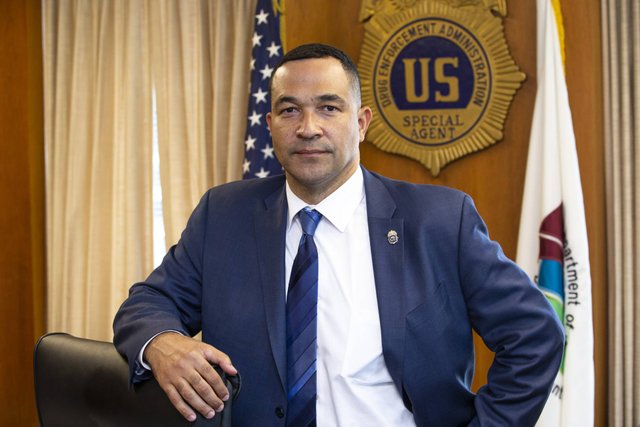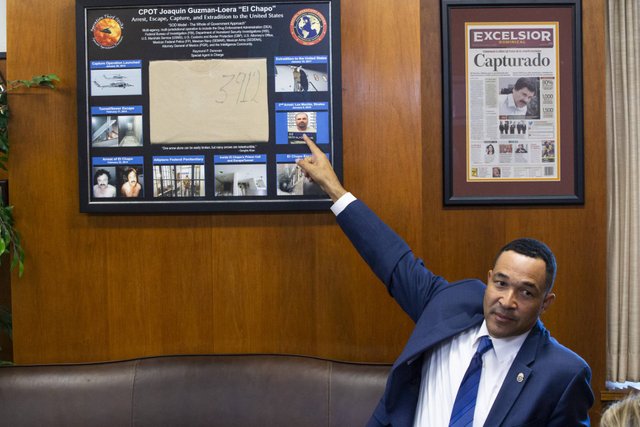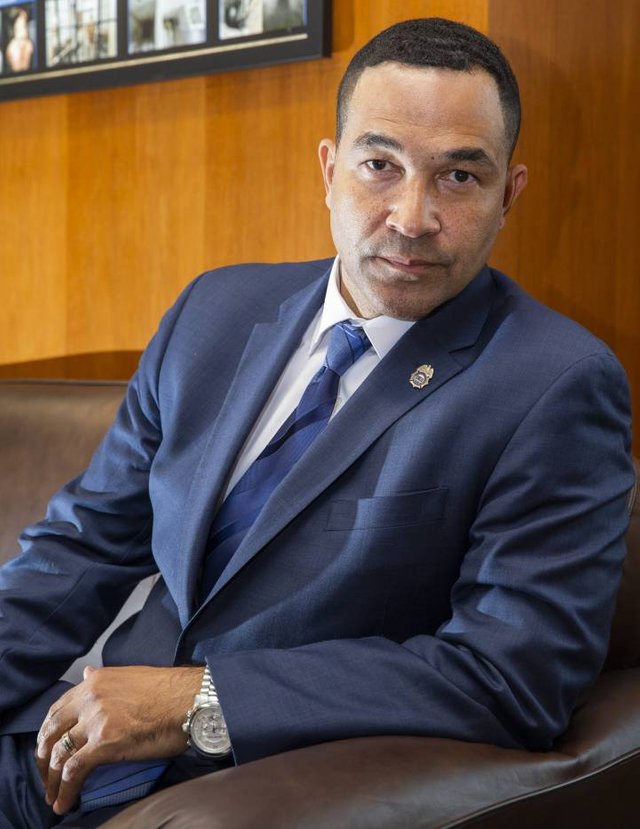“Caro Quintero is the most wanted drug dealer in the DEA, it's something personal”
The drug agent details how drug trafficking has been sophisticated with new ways of money laundering, distributing drugs and amassing profits with substances such as fentanyl

The shirt that Joaquín Guzmán Loera, El Chapo, wore the night he arrived extradited to the United States, on January 20, 2017, is framed on the wall of the special agent Ray Donovan's office with the prisoner number written in black: 3912 El Chapo, El Rapido, El Señor, El Jefe, El Nana, El Apá, El Viejo, El Papa. Under a thousand different aliases, the shadow of the greatest drug trafficker on the planet had accompanied Donovan much of his career, which began in the nineties, first patrolling in California and then in New York, looking for kilos of cocaine under trucks full of watermelons. In 2012, he was assigned to the Special Operations Division of the Drug Enforcement Agency (DEA), which goes directly into action in different countries, coordinated with local authorities, from the headquarters in Virginia.
Because El Chapo was the leader of the Sinaloa cartel, the big drug supplier in New York; the author of hundreds of deaths and tortures; the guy who had run away from justice for the first time in 2001. El Chapo was the fixation of Ray Donovan. Assigned to the section carrying Canada, Mexico and Central America, he oversaw the operation that led to his new arrest in February 2015. He escaped again. When a plane finally brought him to respond to US justice, almost two years later - he had been recaptured in January 2016 -, there was not much dispute: the garment worn by prisoner 3912 was for the agent who had it engraved on fire in the mind.
Does researching guys like this for so many years end up becoming something personal, an obsession? "You dream about it, you become obsessed, or just what you are trying to do is find out how to find him, how to get to his organization," explains the special agent from his office in Manhattan.
Born and raised in the Bronx, with Puerto Rican and Irish origins, Ray Donovan has the name of a tough type of television. There is, in fact, a television series with that name, about a mixture of antihero and "man for everything" that moves in the sewers of Hollywood. The real Donovan has also lived movie stories, but the blood shed by the Sinaloa cartel is real, sleepless nights too, and obsessions. Joaquín Guzmán's escape ended last Wednesday, when a Brooklyn judge sentenced him to life imprisonment; but the battle of Donovan follows red hot: he is now the head of the New York Drug Enforcement Agency and New York is the main heroin hub of the United States.

"The Sinaloa cartel continues to control most of the distribution markets in the US People think of El Chapo, but we have Ismael El Mayo Zambada [who, along with Guzmán, has been considered the most powerful man of the Sinaloa cartel], the children of El Chapo, Iván and José Alfredo, also his brother, they continue to produce methamphetamine, grow opium and traffic fentanyl and cocaine to the United States, Mayo is the new leader, but for us there is another very important person, Rafael Caro Quintero, "he says.
The agent's face changes when he pronounces the name of the person known as Narco de Narcos. "The number one priority of the DEA is Rafael Caro Quintero, he killed one of our agents, Kiki Camarena," he says, "there are also El Chapo's children, obviously, and others, they are all on our website, but for us Rafael Caro Quintero is something personal. "
Kiki [Enrique] Camarena was an undercover agent of the DEA that operated in Mexico in the eighties. The justice considered proven that in 1985 he was kidnapped by the Guadalajara cartel and tortured with sadism, while a doctor kept him alive to prolong his suffering. When they found the body, the test revealed that he had been castrated and buried alive. Caro Quintero dropped 40 years, but in 2013, 12 after serving the full sentence, a jury considered that there was a defect in form and released him. When that controversial sentence was invalidated, the narco had already become invisible. Since he was released from prison, the agent says, "he has returned to business, the context is no longer the same, but he has certainly returned to traffic."

The drug business has been transformed in recent decades in the heat of other technological and economic changes, as one more industry. In New York, "money laundering was historically controlled by Colombians, but now they are Chinese criminal networks in conjunction with Mexican cartels." The way in which transactions are executed has also changed. "Before the traffickers needed to have a contact in Mexico, Colombia, Guatemala, Dominican Republic ... A point of contact, but they no longer need it, they can go to the dark web, ask for whatever they want and have it sent to the door of their house, they ask for 100 grams, over here, 300 over there, another 300 ... and it reaches them, "Donovan explains.
They use cryptocurrencies and the transport services that the rest of the world uses. "DHL, FedEx, UPS, even the public postal service. And if the JFK airport receives a million packages a day, that is the challenge we face." "We have cases - the agent continues - of people who have not traveled to Mexico in their lives, but start in their parents' basement," he adds, opening his eyes wide. "They receive drugs from China and distribute them all over the world. Many times, they buy machinery to produce the pills and use them to turn fentanyl into something that looks like a pharmaceutical pill, like Oxycontin, they sell it on the street as if out and people die. "
The combined consumption of fentanyl, one of the most lethal drugs in history - 100 times more potent than morphine and 50 times more than heroin - has reaped thousands of lives in the United States. The number of deaths from drug overdoses, in general, had been growing since 1990 until a slight decrease was experienced in 2018. The alarms went off in 2016: that year so many Americans died from that cause than in the 19 years of the Vietnam War.
Throughout the interview, Donovan emphasizes that nothing the agency does would be possible without Mexican collaboration, soldiers and the Prosecutor's Office. He does not want, he insists, "that people believe that the DEA goes to those countries to do whatever it takes." The collaboration is very close, and the last arrest of El Chapo, a purely Mexican work. His last escape, that of 2015, was a hard blow to morale, but Donovan says he always trusted to catch him again. "Thanks to all the previous work we knew a lot more about him, his habits, who he trusted, who his family was, his collaborators ... Our people in Mexico, the Mexican Government, we all got together again, in a great meeting in San Diego and we said: 'Let's do it again. "
El Chapo is already in the maximum security prison Supermax, in Colorado, colloquially known as The Alcatraz de las Rocosas, the place where he will spend the rest of his days. But the DEA does not forget others, especially Caro Quintero.
Big pharma is also to blame for this mess as well. The overprescription of opiate drugs like oxycontin led many to become addicts and start chasing heroin and fentanyl. Causing the illegal drug trade to thrive.